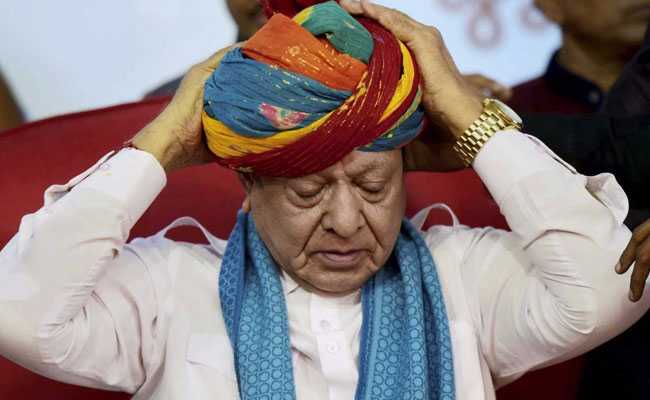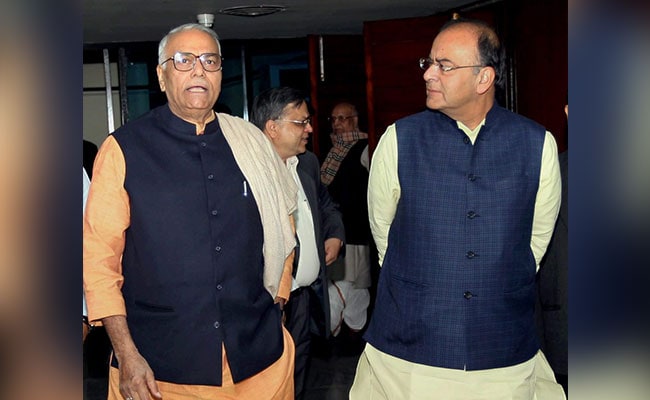Shankersinh Vaghela is a Gujarati politician raised in the political nurseries of the Sangh Parivar. From being a swayamsevak, he became a member of the Bharatiya Jan Sangh, the political arm of the RSS and the predecessor of the Bharatiya Janata Party. He was for more than a decade the president of the BJP in Gujarat. After a factional struggle in the mid-90s, Vaghela left the BJP and became the chief minister of Gujarat with the support of the Congress in 1996. For the 1998 elections, this veteran sanghi merged his breakaway faction with the Congress. The BJP wiped the floor with the Congress in that election, and since then, Gujarat has been a BJP pocket borough, first led by Keshubhai Patel and then by Narendra Modi and his proteges.
Meanwhile, Vaghela, despite having failed to deliver Gujarat, flourished as a Congress politician in many avatars: as an MP, as a cabinet minister, as the president of the Gujarat PCC and lately, as the leader of the opposition, such as it was, in the Gujarat assembly. Two decades of consistent failure did nothing to change the Congress's mind about the wisdom of branding itself Gujarat's majoritarian 'B' team by fostering this RSS cuckoo. Vaghela, however, decided that enough was enough and left the Congress in July this year.
The Congress decision to co-opt Vaghela was based on two considerations. One, Vaghela represented a community of neo-Kshatriyas that was a counterweight to Gujarat's principal dominant peasant caste, the Patidars or Patels, who had been alienated by the Congress's strategy of backward caste reservations. Two, the BJP in Gujarat had been enormously strengthened by the Ram-janmabhumi agitation; the Congress, having consistently lost Gujarat elections since 1985, was hoping to steal a section of the Hindutva-vadi vote by nobbling a BJP stalwart.

Shankersinh Vaghela had resigned from the Congress in July
The lesson that the Congress ought to have learnt from the failure of this strategy of cooption should have been that it needed to differentiate itself from the BJP, to build (or rebuild) its own brand. It could have projected itself as the spokesperson of agrarian distress, of urban unemployment, of pluralism. Instead, it tried to pretend that it was a less-feral BJP and discovered that me-too majoritarianism minus the red meat of bigotry has no takers. You can't run against Narendra Modi from the right.
Instead of the Gujarat experience becoming a cautionary tale, the Vaghela Doctrine seems to have resurfaced in the new enthusiasm for seeing turbulence in the BJP as a tide that the opposition might ride, if not to office, then at least to political revival. There is no other way of understanding the feverish publicity and acclaim that liberal commentators and members of opposition parties showered upon aggrieved veterans on the Hindu right who went public with their criticism of this government's management of the economy.
The argument for talking up the criticisms of Subramanian Swamy, Arun Shourie and Yashwant Sinha is that they have all held economy-related portfolios in previous governments, and therefore, their indictments of the Modi government as in-house critics resonate in a way that the criticisms of academic economists and across-the-aisle critics like P.C. Chidambaram, don't.
It's hard to know if anyone takes this argument seriously, but if they do, it must come from political desperation. Of the three, Subramanian Swamy is the only one to have any sort of relationship with the Modi regime: he was given a Rajya Sabha seat without ministerial office. The other two speak from the margins of the party, frozen out by age, egotism and factional rivalry. These men represent the party's past, the average age of this troika is 77. The true believers who put Modi and Shah in office don't care what they think. The fellow travellers and opportunists who were swept up in the 2014 wave might switch to someone who seems like the coming thing, but these men are not the coming thing: no one is going to abandon the BJP on the say so of its has-beens.
The other thing to remember is that all three of them are ideologically majoritarian. Swamy, mistakenly indulged as a court jester, is an alt-right extremist who believes that Indian Muslims should be disenfranchised if they don't acknowledge their Hindu ancestry. Shourie could have played Torquemada to Modi's King Ferdinand had he been given the opportunity, but he wasn't. Before Yashwant Sinha made the headlines with his column berating Jaitley he was last heard of trying to breach prohibitory orders by leading a Ram Navami procession past a Muslim neighbourhood, down a banned route.

Yashwant Sinha had recently targeted Arun Jaitley on the state of the economy
There is a photograph that sums up the continuing relevance of the Vaghela Doctrine. It was taken at a recent book launch in Delhi and it features the author of the book, Manish Tewari, a minister in the last UPA government, Arvind Kejriwal, the chief minister of Delhi, and Yashwant Sinha, soon after his anti-Jaitley jeremiad. Yashwant Sinha plays the smiling elder statesman as Tewari pumps his hand and an eager, grinning Kejriwal waits his turn, arm outstretched. It's an embarrassing tableau: the leader of the Aam Aadmi Party and a Congressman falling over themselves to celebrate the heresies of an aggrieved BJP veteran.
The Vaghela Doctrine assumed that there was no political cost to snuggling up to Hindutva-vadi politicians. Where would Gujarat's Muslims go? There's something of that complacency in this present embrace of potential defectors from the dark side. The 'natural' constituencies of the anti-BJP opposition, the 'votebanks' it takes for granted, those much-invoked Dalit, OBC or minority voters, might not turn out in numbers in 2019 if they see opposition leaders ingratiating themselves with Eminent Majoritarians. Images of Kejriwal in close attendance as Sri Sri Ravi Shankar and his "World Cultural Festival" vandalized the floodplain of the Yamuna not long ago, come to mind. There is a political cost to neglecting your base; elections the world over this past year have borne witness to that.
The election victories of the BJP since 2014 created a defensive knowingness in a battered opposition and a beleaguered commentariat. It is an anti-political knowingness that puts its faith in managerial expertise (the Prashant Kishor option) or the follies of a hubristic ruling party. There is an opportunity in the economic downturn for the opposition to exploit, but harvesting the disillusionment involves showing the electorate that the opposition is a political alternative to the BJP, not a chorus amplifying the complaints of the prime minister's thwarted rivals. Now that Shankersinh Vaghela has left the building, it's time to build a post-Vaghelan politics.
Mukul Kesavan is a writer based in Delhi. His most recent book is 'Homeless on Google Earth' (Permanent Black, 2013).
Disclaimer: The opinions expressed within this article are the personal opinions of the author. The facts and opinions appearing in the article do not reflect the views of NDTV and NDTV does not assume any responsibility or liability for the same.


